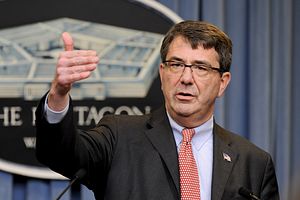Yesterday, the Washington Post reported that the Pentagon’s enigmatic internal think tank, the Office of Net Assessment, has received its directives on the future focus of its research and analysis efforts in the service of the U.S. Secretary of Defense.
In a June 4 memo titled “Guidance,” Defense Secretary Ashton Carter outlined that he expects the institution, which has a $10 million annual budget and is headed by ret. Air Force Col. James H. Baker, to focus its expertise more on current defense policy issues rather than hypothetical future threats.
“The Office of Net Assessment has long been my predecessors’ source of independent, long term, deep thinking about our future. That is the legacy I expect you to maintain and upon which I expect you to build,” the memo reads. However, Carter emphasizes that analyzing the future of warfare should not come at the expense of up-to-date informed advice on current pressing policy issues for the secretary of defense:
[H]elp me think about the long-term consequences of near-term policy decisions. Your work remains future focused, but you must ensure the team’s work has present relevance to me.
Additionally, he wants the office’s work to emphasize “finding opportunities, rather than just challenges” and have stronger ties to the American intelligence agencies.
The memo also notes that the Office of Net Assessment will now have access to all classified Department of Defense programs. The Pentagon’s homepage features the following mission statement of the think tank:
The Office of Net Assessment is an independent organization within DoD and is charged with identifying emerging or future threats and opportunities for the United States. To do so, the office develops and assesses standing trends and future prospects of U.S. military capabilities, in comparison with other countries.
Reactions from the community of American strategic thinkers to Carter’s memo have generally been negative. For example, one analyst noted that Carter’s decision “will have long lasting negative consequences for our national security intellectual capital.” Additionally, he observes:
Woven throughout the DOD nomenklatura, we have legions of people, uniformed and civilian with billions of dedicated budgetary dollars, working on the present and immediate future. If that isn’t enough to serve the needs of the Secretary to the degree that we have to dilute and degrade ONA’s core competency, then I would argue that the SECDEF’s restructuring and re-missioning is being focused in the wrong direction.
Up until the end of 2014, the Office of Net Assessment was headed for four decades by Andrew Marshall, one of the longest-serving U.S. civil servants in the country’s history. The 93-year-old, nicknamed “Yoda,” due to his enigmatic assertions and his devoted band of followers, has gained somewhat of a celebrity status among inside-the-beltway defense analysts.
Back in January, I wrote a longer piece on Andrew Marshall (see: “Is the Pentagon’s Andrew Marshall the Leo Strauss of Military Analysis?”) and would like to quote from my concluding two paragraphs:
If net assessments are made for the Pentagon’s use or power, we are likely to operate in a confined analytical space in which rules and values are applied arbitrarily to fit American thinking (…)
In other words, if the principle customer of a net assessment is the U.S. Secretary of Defense, and you, as the new director of net assessment, call a bloated bureaucracy like the Pentagon your home, chances are that your analysis is much more heavily influenced by your environment than it is by actual developments in the world. Marshall acknowledged the problem of this in his theory of bureaucratic politics (and many of Marshall’s disciples recognize similar issues in different levels of analysis), yet I posit (…)[that] the problem is not just one of escaping a bureaucracy, but that of a lack of ability to disenthrall ourselves from the American analytical mindset overall, to the detriment of good defense analysis.

































